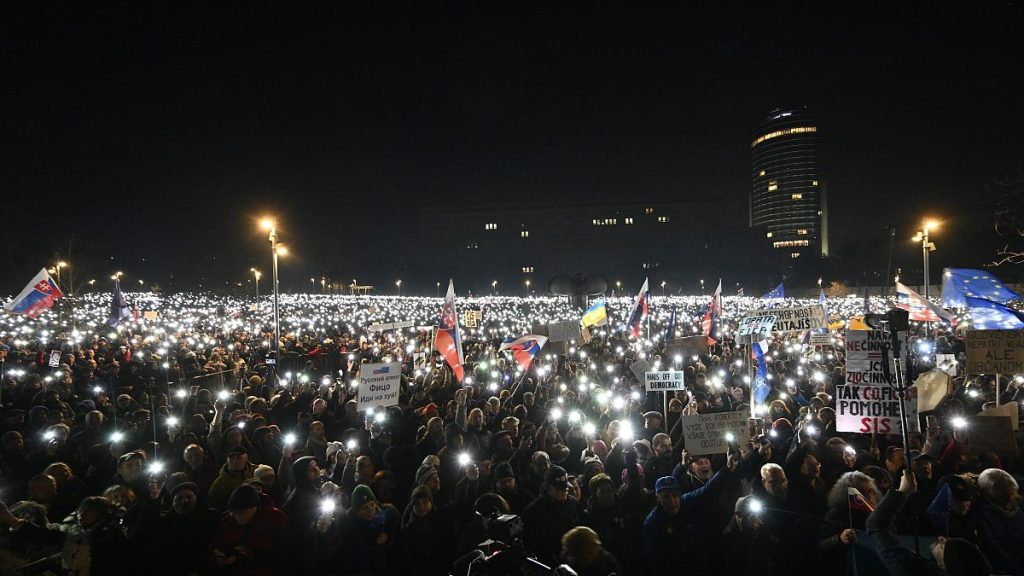The political landscape in Slovakia has become increasingly turbulent in recent months, marked by widespread public dissent against the policies of Prime Minister Robert Fico, particularly his perceived pro-Russia stance and his government’s shift away from traditional Western alliances. This discontent culminated in a series of large-scale demonstrations across the country, triggered by Fico’s controversial visit to Moscow to meet with Russian President Vladimir Putin, a move widely condemned by the EU and NATO allies. This visit, viewed as a stark departure from the established norms of European leadership in the wake of Russia’s invasion of Ukraine, further inflamed public opinion and galvanized the opposition. Protesters, numbering in the tens of thousands, have taken to the streets to express their anxieties about Slovakia’s future direction and their commitment to European values and integration.
At the heart of the public outcry are Fico’s contentious pronouncements regarding Slovakia’s foreign policy orientation. His suggestion of a potential departure from the European Union and NATO, along with his cessation of military aid to Ukraine, his criticism of EU sanctions against Russia, and his opposition to Ukraine’s NATO membership, have stoked fears of the country’s drift towards Moscow’s sphere of influence. These actions stand in stark contrast to the prevailing sentiments within the EU and NATO, which have largely condemned Russia’s actions in Ukraine and taken a united stance in support of Kyiv. This divergence has raised concerns about Slovakia’s commitment to democratic principles and its place within the Western alliance system.
Adding fuel to the fire, Fico has accused protest organizers and the political opposition of collaborating with foreign entities to orchestrate a coup against his government. Citing a classified report by the Slovak Information Service (SIS), the country’s intelligence agency, Fico alleged a plot involving the occupation of government buildings, road blockades, a nationwide strike, and clashes with law enforcement. This claim has further polarized the nation, with the opposition dismissing the report as a politically motivated smear campaign designed to suppress dissent and discredit their efforts. The opposition has also accused Fico of manipulating the SIS for his own political gain, eroding public trust in the agency and further exacerbating tensions.
The escalating political rhetoric has created an atmosphere of uncertainty and apprehension in Slovakia. While Fico insists that the situation is serious and requires decisive action, the opposition and protest organizers maintain that their actions are peaceful and motivated by genuine concerns about the country’s trajectory. This clash of narratives has raised concerns about the potential for further unrest and the erosion of democratic institutions. The public protests, however, have remained peaceful, contradicting Fico’s claims of impending violence. Organizers have emphasized their commitment to peaceful demonstrations and have vowed to continue their efforts to express their dissent.
The central theme of the protests revolves around a reaffirmation of Slovakia’s European identity and a rejection of any alignment with Russia. Protest leaders like Marián Kulich, Managing Director of the Peace for Ukraine organization, have articulated the desire to uphold European values and distance Slovakia from Russia’s influence. This sentiment reflects a deep-seated concern among many Slovaks about the potential erosion of democratic principles and the loss of the freedoms and opportunities afforded by EU membership. The protests highlight a fundamental division within Slovak society between those who favor maintaining strong ties with the West and those who perceive a closer relationship with Russia as being in the country’s best interest.
The ongoing political crisis in Slovakia reflects a broader struggle playing out across Europe in the aftermath of Russia’s invasion of Ukraine. The conflict has exposed deep divisions within societies about national identity, geopolitical alliances, and the future of the European project. Fico’s rise to power and his pursuit of a more pro-Russia policy reflect a segment of the population that feels disenfranchised by the current political order and seeks alternative alliances. The protests, on the other hand, represent a strong countervailing force that seeks to preserve Slovakia’s ties to the West and uphold democratic values. The trajectory of this conflict will have significant implications for Slovakia’s future and its place within the European community.














